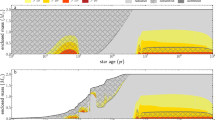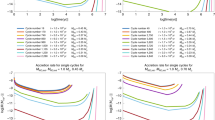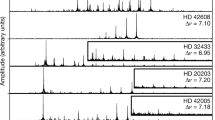Abstract
There is much evidence that many post-main sequence stars are losing mass, that the integrated mass loss is sufficient to affect their evolution and that epochs of substantial mass loss are normal for almost all stars. However, neither the precise timing, nor the mechanisms, nor the full consequences of this mass loss are yet well understood. Stellar pulsation may play a key role: it is closely associated with evolutionary phases where substantial mass loss occurs, and there are good physical reasons to expect pulsation to cause, or at least greatly to enhance, mass loss. Here we point out that there are many possible consequences, some not previously recognized, of pulsation-related mass loss for the evolutionary behaviour of post-main sequence stars. We advance the hypothesis that most mass loss of evolutionary significance is closely related to stellar pulsation.
This is a preview of subscription content, access via your institution
Access options
Subscribe to this journal
Receive 51 print issues and online access
$199.00 per year
only $3.90 per issue
Buy this article
- Purchase on Springer Link
- Instant access to full article PDF
Prices may be subject to local taxes which are calculated during checkout
Similar content being viewed by others
References
Willson, L. A. & Hill, S. J. Astrophys. J. 228, 854–869 (1979).
Iben, I. & Renzini, A. A. Rev. Astr. Astrophys. 21, 271–342 (1983).
Liebert, J. A. Rev. Astr. Astrophys. 18, 363–398 (1980).
Willson, L. A. IAU Colloq. 59, 353–355 (1981).
Iben, I. & Rood, R. T. Astrophys. J. 161, 587–617 (1970).
Iben, I. A. Rev. Astr. Astrophys. 12, 215–256 (1974).
van Albada, T. S. & Baker, N. Astrophys. J. 185, 477–498 (1973).
Stellingwerf, R. F. Astrophys. J. 195, 441–466 (1975).
Cox, A. N., Hodson, S. W. & Clancy, W. D. Astrophys. J. 266, 94–104 (1983).
Wallerstein, G. & Cox, A. N. Preprint, Univ. Washington (1984).
Schonberner, D. & Drilling, J. S. Astrophys. J. 278, 702–710 (1984).
Cox, A. A. Rev. Astrophys. 18, 15–41 (1980).
Becker, S. IAU Colloq. 82 (in the press).
Gehrz, R. D. & Woolf, N. J. Astrophys. J. Lett. 161, L213–L217 (1970).
Havlen, R. J. Astr. Astrophys. 16, 252–267 (1972).
Schmidt, E. G. & Parsons, S. B. Astrophys. J. 279, 202–214 (1984).
Feast, M. W. Preprint, S. Afr. Astron. Observatory (1984).
Schmidt, E. G. IAU Colloq. 82 (in the press).
Feast, M. W. IAU Symp. 67, 129–141 (1975).
Noel, A. & Gabriel, M. Liege Symp. (1984).
Maeder, A. Astr. Astrophys. 90, 311–317 (1980).
Author information
Authors and Affiliations
Rights and permissions
About this article
Cite this article
Willson, L., Bowen, G. Effects of pulsation and mass loss on stellar evolution. Nature 312, 429–431 (1984). https://doi.org/10.1038/312429a0
Received:
Accepted:
Issue Date:
DOI: https://doi.org/10.1038/312429a0
This article is cited by
-
Horizontal branch stars: the interplay between observations and theory, and insights into the formation of the Galaxy
Astrophysics and Space Science (2009)
-
Evidence for mass loss in visual binary stars
Astrophysics and Space Science (1988)
-
Evidence for mass loss from IRAS observations of classical Cepheids
Nature (1986)
Comments
By submitting a comment you agree to abide by our Terms and Community Guidelines. If you find something abusive or that does not comply with our terms or guidelines please flag it as inappropriate.



